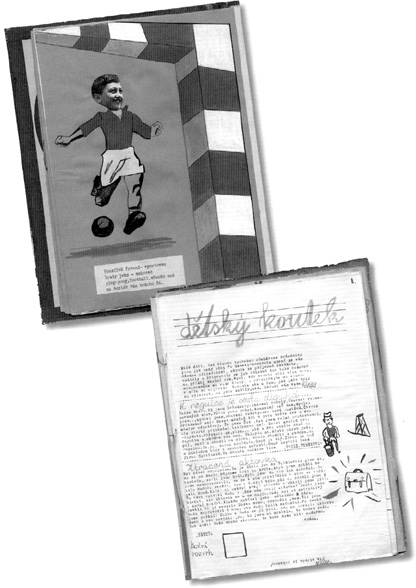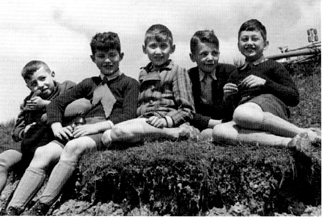
One warm day, Rabbi Ferda, who was in charge of school excursions, announced to Mr. Frisch’s class that he was taking them to visit the viaduct where the rivers Vltava and Malse met. John was so happy. Outings like this were a highlight for him. The children enjoyed Rabbi Ferda’s company, and besides, John and his friends would be able to skip school. It was much more fun to be outdoors than stuck inside learning Latin!
After lunch, they set off with Rabbi Ferda. For the most part, it was safer for the children to be away from town. The Nazis did not regularly patrol the rural areas. Besides, they felt freer in the country, away from the oppressive streets of Budejovice. Rabbi Ferda enjoyed being teacher and guide. On this day there was a lot of excitement in the group, and he had to work hard to keep the children moving. On the way, John and the others entertained themselves with silly jokes, tossing a ball and playfully shoving each other off the path. It was a long walk, and they didn’t stop until they came to the pond. Some dropped wearily to the ground, but others decided to go exploring. They crawled in and out of the large plumbing pipes that carried river water to the town.
Once they arrived at the quarry, John and the others found a place to play soccer and boxing. Who could blame them for being excited? It was warm, and they could run and play freely for the first time in months.
John spotted Tulina playing with a group of girls. He wanted to be close to her and to talk to her. She was smart, funny, and pretty. It was difficult for him to hide his crush on her. The others were beginning to notice, and sometimes that was embarrassing. An article about John and Tulina had even appeared in an issue of Klepy:
It was reported that last week John was seen climbing the stairs to the Holzers’ flat, followed by several other boys. He wanted to tell his future mother-in-law that he was in love with Tulina. And you know, one of the other boys who accompanied John said that some boys had seen him kissing their younger daughter. Mrs. Holzer, although pleased that the son of the local pediatrician would be interested in the daughter of the poorest Jewish family in town, flew into a rage and threw the whole bunch of kids down the stairs.
It was a terrible lie! John really liked Tulina, and maybe he even dreamed about kissing her, but he had never yet kissed a girl. It was hard to face Tulina after that story was printed.
Now he mustered his courage and walked over to her. “Would you like to play a game of marbles with me?” he asked. Tulina nodded shyly. John sat down next to her and offered her the first large marble. She tossed it, trying to knock the smaller ones into a circle. John was impressed with her skill.

Top: This photo/drawing of John kicking a soccer ball was on the cover of the fifteenth edition of Klepy. The caption says he is a sportsman who plays soccer and table tennis. Bottom: Beda’s article, entitled, “Schoolboy’s Lament.” He writes, “Vacations are here. No more work. No more lessons. Free as birds. It’s a magical time. That is what I thought. But instead of eating, drinking, reading, and going to the swimming hole, I have to take lunch to my father at his forced labor. My fate is bad. Life is like a ship full of misery.”
“Maybe we can play again some time,” he said, when the game ended.
Tulina smiled and her dark eyes twinkled. “I’d like that,” she said.
John was more smitten than ever.
He returned to his own group, who were resting underneath a tall, budding chestnut tree. The sun blinked through the spreading branches as they swayed in the breeze. John felt as content as those branches, moving slowly to a springtime rhythm. He stretched his face up toward the blue sky and breathed in deeply. Then he looked over at the boys who were lying under the tree. Beda was there, of course, along with Rudi Goldsmith, a boy known as Goliath. The other two were Henry Kohn and Rudi Kopperl, boys of John’s age who were also his good friends.
“Why can’t we do this every day?” John asked. He loved these excursions with Rabbi Ferda and all his friends.
“The walk is so tiring,” complained Beda. “I’d rather be at the swimming hole, or reading a book.”
“I love the swimming hole too,” said John. “But I also like being out in the fields.” He rolled over to lie flat on his stomach. Underneath another tree, Tulina and a group of young girls lay talking and giggling. John stared at Tulina, watching as she pushed her brown curls away from her round, pretty face. She looked up and waved at him. He blushed and sat up to face his friends.
“What’s the first thing you are going to do when we get back to the swimming hole?” asked Beda.
“Play soccer,” replied John. He loved the days of running and playing along the water’s edge. “And you?”
“I’m still going to be stuck doing errands. While the rest of you are playing table tennis and chess, I have to take meals to my father while he’s working.” Several boys nodded their heads silently. Now that it was spring, forced labor had begun again for many of the Jewish men in town, including Beda’s father. These men were being made to dredge the river, to deepen it and avoid a springtime flood.
“I’m thinking of writing an article about it for Klepy,” continued Beda. “I’ll report on the working conditions of the men doing this horrible job.”
In the distance, Rabbi Ferda called out to them, telling them they had ten more minutes to rest before the walk back to their homes.
“Do you think the war will end soon?” asked Beda. Talk of forced labor had pushed his active mind into thoughts of the war. He knew from his own conversations with his family that Hitler’s armies had recently attacked Russia. The war was continuing to grow. At the same time, maybe it would help that Russia, a powerful country, was now on Great Britain’s side. He hoped so.
John shrugged. “I don’t want to think about it.” He didn’t like to talk about the war, especially on this glorious day. There were reminders of war all the time. But today, he didn’t want to think about the restrictions or curfews. As long as he had his friends and days like this, things couldn’t be that bad. “We have to swear we’ll be friends forever,” he said, to all the boys in the group.

The boys who wrote the blood contract, (left to right) Beda Neubauer, Rudi Goldsmith, Rudi Kopperl, Henry Kohn, John Freund.
“How long is forever?” asked Henry Kohn.
“It’s until we’re all grown up, until we’re old,” replied John.
“Let’s promise to meet here in ten years,” said Rudi Kopperl.
John nodded. “We’ll meet at this same spot, under this same chestnut tree.”
The boys agreed eagerly. “But it has to be more than just a promise,” added John. “We have to write it down, like a contract, to show how serious we are about the pledge.”
Beda pulled a piece of paper from his back pocket, along with a small pencil. First, he listed the names of the five of them: John, Henry, the two Rudis, and himself. Then he wrote out an agreement vowing that they would all remain friends, and would return to this same spot in ten years’ time. The boys passed the contract around and nodded their approval. But that still wasn’t enough for John.
“Now we have to have a special ceremony, and swear we’ll all follow the contract,” he said. “And we have to sign the agreement in blood.”
The boys solemnly agreed. This was an important moment for them, an opportunity to demonstrate how valuable their friendship was. In spite of the war and the sense of danger that surrounded them, they had to hold onto the hope and belief that they would be fine, that their friendship and their lives would endure. This oath would honor and unite that friendship.
They searched around the chestnut tree and found a sharp stick. One by one, they dug the stick into their hands, piercing a finger, and smearing a drop of blood onto the contract next to their names.
“There,” said John, satisfied at last. “That part’s done.”
“But what are we going to do with it?” asked Beda, staring at the blood contract. “Which one of us has to take care of it?”
They decided to bury the contract underneath the chestnut tree, so that it would pull them back to this spot in the future. Once again they set to work, digging a hole underneath the tree. As they dug, one of the boys found an old metal box. It was a perfect container to preserve the contract. They placed the contract in the box, closed its lid, set it in the ground, and covered it with dirt. The contract was safe.
The boys stood staring down at the spot that they hoped would be their meeting place in ten years’ time. They looked gravely at one another, shook hands, and returned to the rest of the group.